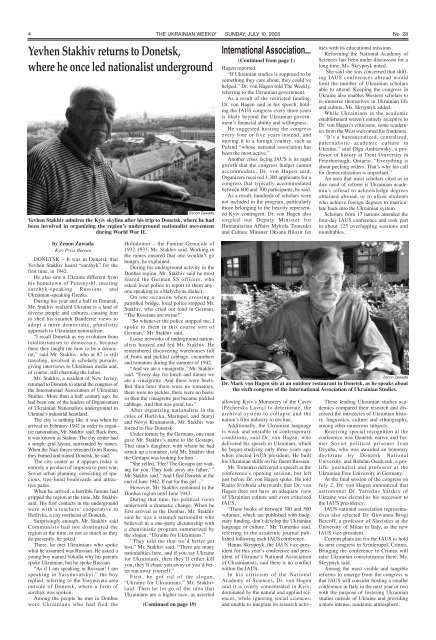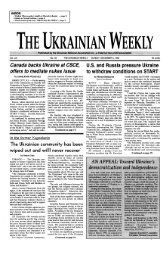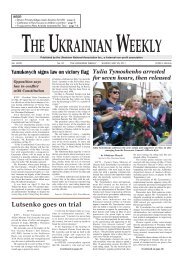International Association of Ukrainian Studies seeks reform in ...
International Association of Ukrainian Studies seeks reform in ...
International Association of Ukrainian Studies seeks reform in ...
You also want an ePaper? Increase the reach of your titles
YUMPU automatically turns print PDFs into web optimized ePapers that Google loves.
4 THE UKRAINIAN WEEKLY SUNDAY, JULY 10, 2005No. 28Yevhen Stakhiv returns to Donetsk,where he once led nationalist undergroundZenon ZawadaYevhen Stakhiv admires the Kyiv skyl<strong>in</strong>e after his trip to Donetsk, where he hadbeen <strong>in</strong>volved <strong>in</strong> organiz<strong>in</strong>g the region’s underground nationalist movementdur<strong>in</strong>g World War II.<strong>International</strong> <strong>Association</strong>...(Cont<strong>in</strong>ued from page 1)Hagen reported.“If <strong>Ukra<strong>in</strong>ian</strong> studies is supposed to besometh<strong>in</strong>g they care about, they could’vehelped,” Dr. von Hagen told The Weekly,referr<strong>in</strong>g to the <strong>Ukra<strong>in</strong>ian</strong> government.As a result <strong>of</strong> the restricted fund<strong>in</strong>g,Dr. von Hagen said <strong>in</strong> his speech, hold<strong>in</strong>gthe IAUS congress every three yearsis likely beyond the <strong>Ukra<strong>in</strong>ian</strong> government’sf<strong>in</strong>ancial ability and will<strong>in</strong>gness.He suggested host<strong>in</strong>g the congressevery four or five years <strong>in</strong>stead, andmov<strong>in</strong>g it to a foreign country, such asPoland “whose national association hasbeen the most active.”Another crisis fac<strong>in</strong>g IAUS is its rapidgrowth that the congress budget cannotaccommodate, Dr. von Hagen said.Organizers received 1,300 applicants for acongress that typically accommodatedbetween 600 and 700 participants, he said.As a result, hundreds <strong>of</strong> scholars werenot <strong>in</strong>cluded <strong>in</strong> the program, particularlythose belong<strong>in</strong>g to the heavily representedKyiv cont<strong>in</strong>gent. Dr. von Hagen alsos<strong>in</strong>gled out Deputy M<strong>in</strong>ister forHumanitarian Affairs Mykola Tomenkoand Culture M<strong>in</strong>ister Oksana Bilozir forities with its educational missions.Reform<strong>in</strong>g the National Academy <strong>of</strong>Sciences has been under discussion for along time, Ms. Skrypnyk noted.She said she was concerned that shift<strong>in</strong>gIAUS conferences abroad wouldlimit the number <strong>of</strong> <strong>Ukra<strong>in</strong>ian</strong> scholarsable to attend. Keep<strong>in</strong>g the congress <strong>in</strong>Ukra<strong>in</strong>e also enables Western scholars tore-immerse themselves <strong>in</strong> <strong>Ukra<strong>in</strong>ian</strong> lifeand culture, Ms. Skrypnyk added.While <strong>Ukra<strong>in</strong>ian</strong>s <strong>in</strong> the academicestablishment weren’t entirely receptive toDr. von Hagen’s criticisms, some academicsfrom the West welcomed his frankness.“It’s a bureaucratized, centralized,paternalistic academic culture <strong>in</strong>Ukra<strong>in</strong>e,” said Olga Andriewsky, a pr<strong>of</strong>essor<strong>of</strong> history at Trent University <strong>in</strong>Peterborough, Ontario. “Everyth<strong>in</strong>g isabout peck<strong>in</strong>g orders. That’s why his callfor democratization is important.”An area that most scholars cited as <strong>in</strong>dire need <strong>of</strong> <strong>reform</strong> is <strong>Ukra<strong>in</strong>ian</strong> academia’srefusal to acknowledge degreesobta<strong>in</strong>ed abroad, or to allow studentswho achieve foreign degrees to matriculateback <strong>in</strong>to the <strong>Ukra<strong>in</strong>ian</strong> system.Scholars from 17 nations attended thefour-day IAUS conference and took part<strong>in</strong> about 125 overlapp<strong>in</strong>g sessions androundtables.by Zenon ZawadaKyiv Press BureauDONETSK – It was <strong>in</strong> Donetsk thatYevhen Stakhiv heard “surzhyk” for thefirst time, <strong>in</strong> 1942.He also saw a Ukra<strong>in</strong>e different fromhis hometown <strong>of</strong> Peremyshl, meet<strong>in</strong>gsurzhyk-speak<strong>in</strong>g Russians and<strong>Ukra<strong>in</strong>ian</strong>-speak<strong>in</strong>g Greeks.Dur<strong>in</strong>g his year and a half <strong>in</strong> Donetsk,Mr. Stakhiv realized Ukra<strong>in</strong>e is a land <strong>of</strong>diverse people and cultures, caus<strong>in</strong>g himto shed his staunch Banderite views toadopt a more democratic, pluralisticapproach to <strong>Ukra<strong>in</strong>ian</strong> nationalism.“I recall Donetsk as my evolution fromtotalitarianism to democracy, becausethere they taught me how to be a democrat,”said Mr. Stakhiv, who at 87 is stilltravel<strong>in</strong>g, <strong>in</strong>volved <strong>in</strong> scholarly pursuits,giv<strong>in</strong>g <strong>in</strong>terviews to <strong>Ukra<strong>in</strong>ian</strong> media and,<strong>of</strong> course, still charm<strong>in</strong>g the ladies.Mr. Stakhiv, a resident <strong>of</strong> New Jersey,returned to Donetsk to attend the congress <strong>of</strong>the <strong>International</strong> <strong>Association</strong> <strong>of</strong> <strong>Ukra<strong>in</strong>ian</strong><strong>Studies</strong>. More than a half century ago, hehad been one <strong>of</strong> the leaders <strong>of</strong> Organization<strong>of</strong> <strong>Ukra<strong>in</strong>ian</strong> Nationalists underground <strong>in</strong>Ukra<strong>in</strong>e’s <strong>in</strong>dustrial heartland.The city is noth<strong>in</strong>g like it was when hearrived <strong>in</strong> February 1942 <strong>in</strong> order to organizenationalists, Mr. Stakhiv said. Back then,it was known as Stal<strong>in</strong>o. The city center hada simple grid layout, surrounded by m<strong>in</strong>es.When the Nazi forces retreated from Russia,they burned and ru<strong>in</strong>ed Donetsk, he said.The city center as it appears today isentirely a product <strong>of</strong> impressive post-war,Soviet urban plann<strong>in</strong>g, consist<strong>in</strong>g <strong>of</strong> spacious,tree-l<strong>in</strong>ed boulevards and attractiveparks.When he arrived, a horrible fam<strong>in</strong>e hadgripped the region at the time, Mr. Stakhivsaid. His first contacts <strong>in</strong> the undergroundwere with a teachers’ cooperative <strong>in</strong>Horlivka, a city northeast <strong>of</strong> Donetsk.Surpris<strong>in</strong>gly enough, Mr. Stakhiv saidCommunists had not dom<strong>in</strong>ated theregion at the time, or not as much as theydo presently, he joked.There, he met <strong>Ukra<strong>in</strong>ian</strong>s who spokewhat he assumed was Russian. He asked ayoung boy named Volodia why his parentsspoke <strong>Ukra<strong>in</strong>ian</strong>, but he spoke Russian.“As if I am speak<strong>in</strong>g <strong>in</strong> Russian! I amspeak<strong>in</strong>g <strong>in</strong> Yasynuvatskyi,” the boyreplied, referr<strong>in</strong>g to the Yasynuvata areaoutside <strong>of</strong> Donetsk, where a form <strong>of</strong>surzhyk was spoken.Among the people he met <strong>in</strong> Donbaswere <strong>Ukra<strong>in</strong>ian</strong>s who had fled theHolodomor – the Fam<strong>in</strong>e-Genocide <strong>of</strong>1932-1933, Mr. Stakhiv said. Work<strong>in</strong>g <strong>in</strong>the m<strong>in</strong>es ensured that one wouldn’t gohungry, he expla<strong>in</strong>ed.Dur<strong>in</strong>g his underground activity <strong>in</strong> theDonbas region, Mr. Stakhiv said he mostfeared the German SS <strong>of</strong>ficers, whoasked local police to report to them anyonespeak<strong>in</strong>g <strong>in</strong> a Halychyna dialect.On one occasion when cross<strong>in</strong>g apatrolled bridge, local police stopped Mr.Stakhiv, who cried out loud <strong>in</strong> German,“The Russians are sw<strong>in</strong>e!”“So whenever the police stopped me, Ispoke to them <strong>in</strong> this coarse sort <strong>of</strong>German,” Mr. Stakhiv said.Loose networks <strong>of</strong> underground nationalistshoused and fed Mr. Stakhiv. Heremembered discover<strong>in</strong>g warehouses full<strong>of</strong> fruits and pickled cabbage, cucumbersand tomatoes dur<strong>in</strong>g the summer <strong>of</strong> 1942.“And we ate a v<strong>in</strong>aigrette,” Mr. Stakhivsaid. “Every day for lunch and d<strong>in</strong>ner weate a v<strong>in</strong>aigrette. And there were beets.But then later there were no tomatoes,there were no pickles, there were no beets;so then the v<strong>in</strong>aigrette just became pickledcabbage. And that was good, too.”After organiz<strong>in</strong>g nationalists <strong>in</strong> thecities <strong>of</strong> Horlivka, Mariupol, and Staryiand Novyi Kramatorsk, Mr. Stakhiv wasforced to flee Donetsk.Under torture by the Germans, one mangave Mr. Stakhiv’s name to the Gestapo.That man’s daughter, with whom he hadstruck up a romance, told Mr. Stakhiv thatthe Gestapo was look<strong>in</strong>g for him.“She yelled, ‘Flee! The Gestapo are wait<strong>in</strong>gfor you. They took away my father,’ ”Mr. Stakhiv said. “And I fled Donetsk at theend <strong>of</strong> June 1942. If not for this girl ...”However, Mr. Stakhiv rema<strong>in</strong>ed <strong>in</strong> theDonbas region until June 1943.Dur<strong>in</strong>g that time, his political viewsunderwent a dramatic change. When hefirst arrived <strong>in</strong> the Donbas, Mr. Stakhivsaid he was a staunch nationalist whobelieved <strong>in</strong> a one-party dictatorship witha chauv<strong>in</strong>istic program summarized bythe slogan, “Ukra<strong>in</strong>e for <strong>Ukra<strong>in</strong>ian</strong>s.”“They told me that we’d better getlost,” Mr. Stakhiv said. “There are manynationalities here, and if you say Ukra<strong>in</strong>efor <strong>Ukra<strong>in</strong>ian</strong>s, then they’ll either killyou, they’ll chase you away or you’d betterrun away yourself.”First, he got rid <strong>of</strong> the slogan,“Ukra<strong>in</strong>e for <strong>Ukra<strong>in</strong>ian</strong>s,” Mr. Stakhivsaid. Then he let go <strong>of</strong> the idea that<strong>Ukra<strong>in</strong>ian</strong>s are a higher race, as asserted(Cont<strong>in</strong>ued on page 19)Zenon ZawadaDr. Mark von Hagen sits at an outdoor restaurant <strong>in</strong> Donetsk, as he speaks aboutthe sixth congress <strong>of</strong> the <strong>International</strong> <strong>Association</strong> <strong>of</strong> <strong>Ukra<strong>in</strong>ian</strong> <strong>Studies</strong>.allow<strong>in</strong>g Kyiv’s Monastery <strong>of</strong> the Caves(Pecherska Lavra) to deteriorate, thearchival system to collapse and thenation’s film <strong>in</strong>dustry to decl<strong>in</strong>e.Additionally, the <strong>Ukra<strong>in</strong>ian</strong> languageis weak and unstable <strong>in</strong> contemporaryconditions, said Dr. von Hagen, whodelivered his speech <strong>in</strong> <strong>Ukra<strong>in</strong>ian</strong>, whichhe began study<strong>in</strong>g only three years agowhen elected IAUS president. He builthis <strong>Ukra<strong>in</strong>ian</strong> skills on his fluent Russian.Mr. Tomenko delivered a speech at theconference’s open<strong>in</strong>g session, but leftjust before Dr. von Hagen spoke. He toldRadio Svoboda afterwards that Dr. vonHagen does not have an adequate view<strong>of</strong> <strong>Ukra<strong>in</strong>ian</strong> culture and even criticizedIAUS.“These books <strong>of</strong> between 300 and 500volumes, which are published with budgetaryfund<strong>in</strong>g, don’t develop the <strong>Ukra<strong>in</strong>ian</strong>language or culture,” Mr. Tomenko said,referr<strong>in</strong>g to the academic journal publishedfollow<strong>in</strong>g each IAUS conference.Hanna Skrypnyk, the IAUS vice-presidentfor this year’s conference and president<strong>of</strong> Ukra<strong>in</strong>e’s National <strong>Association</strong><strong>of</strong> <strong>Ukra<strong>in</strong>ian</strong>ists, said there is no conflictwith<strong>in</strong> the IAUS.In his criticism <strong>of</strong> the NationalAcademy <strong>of</strong> Sciences, Dr. von Hagensaid it is overly concentrated <strong>in</strong> Kyiv;dom<strong>in</strong>ated by the natural and applied sciences,while ignor<strong>in</strong>g social sciences;and unable to <strong>in</strong>tegrate its research activ-These lead<strong>in</strong>g <strong>Ukra<strong>in</strong>ian</strong> studies academicscompared their research and discussedthe <strong>in</strong>tricacies <strong>of</strong> <strong>Ukra<strong>in</strong>ian</strong> history,l<strong>in</strong>guistics, culture and ethnography,among other numerous subjects.Receiv<strong>in</strong>g special recognition at theconference was Donetsk native and formerSoviet political prisoner IvanDzyuba, who was awarded an honorarydoctorate by Donetsk NationalUniversity, and Bohdan Osadczuk, a prolificjournalist and pr<strong>of</strong>essor at the<strong>Ukra<strong>in</strong>ian</strong> Free University <strong>in</strong> Germany.At the f<strong>in</strong>al session <strong>of</strong> the congress onJuly 2, Dr. von Hagen announced thatastronomer Dr. Yaroslav Yatskiv <strong>of</strong>Ukra<strong>in</strong>e was elected as his successor tothe IAUS presidency.IAUS national association representativesalso selected Dr. Giovanna BrogiBerc<strong>of</strong>f, a pr<strong>of</strong>essor <strong>of</strong> Slavistics at theUniversity <strong>of</strong> Milan <strong>in</strong> Italy, as the newIAUS vice-president.Current plans are for the IAUS to holdits next congress <strong>in</strong> Symferopol, Crimea.Br<strong>in</strong>g<strong>in</strong>g the conference to Crimea willraise <strong>Ukra<strong>in</strong>ian</strong> consciousness there, Ms.Skrypnyk said.Among the most visible and tangible<strong>reform</strong>s to emerge from the congress isthat IAUS will consider host<strong>in</strong>g a smallerconference <strong>in</strong> Italy <strong>in</strong> the next year or twowith the purpose <strong>of</strong> foster<strong>in</strong>g <strong>Ukra<strong>in</strong>ian</strong>studies outside <strong>of</strong> Ukra<strong>in</strong>e and provid<strong>in</strong>ga more <strong>in</strong>tense, academic atmosphere.
















